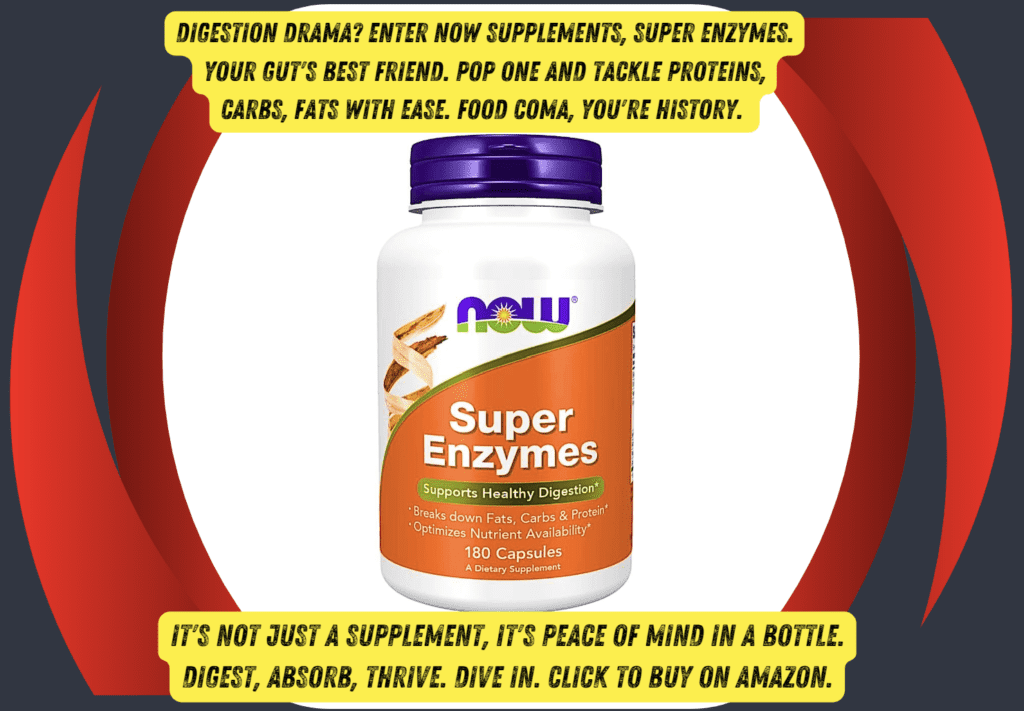Digestive Enzymes and Their Role in Metabolism
Alright, let’s talk about the stuff no one ever mentions at dinner parties. Gut health. Exciting, right? Hold onto your seats. Imagine your digestive system as a chaotic, underground nightclub. Enzymes are the bouncers, nutrients are the VIPs, and every bite you take is a new guest trying to get in. Welcome to the wild world of digestion. It’s messy, it’s complex, and boy, does it get weird. But here’s the twist: it’s absolutely crucial.
Seriously, without good gut health, everything else falls apart. Skin looking dull? Gut. Feeling sluggish? Gut. Weird mood swings? You guessed it, gut. For something so vital, it sure stays out of the spotlight. But not anymore. Let’s shine a light on those fabulous, hardworking digestive players. Ready? Buckle up, it’s going to be an exhilarating ride.
So, here’s the deal with digestive enzymes: they’re these little substances in your body that break down food into nutrients, making sure all that pizza you consume gets transformed into the very essence of life. Not exactly a glamorous job, but someone’s gotta do it, right? And without these unsung heroes, you’d be a bloated mess of undigested lasagna.
First up, we have amylase. This bad boy starts working right in your mouth. Yes, saliva is not just for awkward first kisses and drooling in your sleep. It’s an actual hotspot for carbohydrate digestion. Who knew?
Next on the guest list is protease. It’s the bouncer of your stomach, making sure all those rowdy proteins get broken down into amino acids. How generous. Say goodbye to that steak from last night, it’s being dismantled as we speak.
And let’s not forget lipase. This enzyme is living its best life breaking down fats into fatty acids and glycerol in your small intestine. Who knew fats had such a dramatic exit strategy? Lipase FTW!
Did you eat an apple? Congratulations, your small intestine is now hosting a private gala for cellulase, the enzyme that breaks down cellulose. Celery, apples, and other fibrous foods love to party here, but hey, someone’s gotta keep the fiber crowd entertained.
So what happens when you don’t have enough of these enzymes? Well, you could end up feeling gassy, bloated, and about as elegant as a whoopee cushion. Because nothing says “digestive disaster” like improper enzyme function.
But don’t worry, you can always pop some digestive enzyme supplements to help your body out. That’s right, take more pills! Because if you can’t produce the enzymes yourself, store-bought is fine. Medical innovation, amirite?
And for those of you wondering why this even matters, just remember that proper digestion means your body can actually absorb the nutrients it needs to do amazing things, like keep your heart beating and your lungs breathing. Little things, no biggie.
In conclusion, digestive enzymes are the covert operatives of your metabolism. Never seen, never thanked, but always there ensuring you turn food into fuel. Without them, you’re nothing but a human-shaped, nutrient-less black hole.
So next time you chew, give a little mental high-five to amylase, protease, lipase, and cellulase. They’re the real MVPs, keeping you from being an eternal bloated mystery.
And remember folks, while you’re stressing about that big project or what to binge next on Netflix, your digestive enzymes are working overtime. Let’s give it up for them, the true unsung heroes of the human body.
Q&A
Q: What exactly are digestive enzymes?
A: Think of digestive enzymes as the tiny but mighty workers in your stomach and intestines. They break down the food you eat into smaller molecules so your body can actually use those nutrients.
Q: Can I get digestive enzymes from food?
A: Absolutely! Certain foods like pineapples, papayas, mangoes, and avocados naturally contain enzymes that aid digestion. But remember, if you’re really struggling, supplements can also help shore up your stomach’s workforce.
Q: What are signs that I might be low on digestive enzymes?
A: If you’re feeling bloated, gassy, or dealing with undigested food in your stool, your digestive enzyme crew might be lagging. Other symptoms can include diarrhea and nutrient deficiencies.
Q: Are there any risks to taking digestive enzyme supplements?
A: Like anything in life, moderation is key. While supplements can help, overdoing it or relying solely on them could potentially lead to other digestive issues or mask underlying conditions. Always a good idea to consult with a healthcare provider first.
Q: How can I naturally boost my enzyme levels?
A: Chewing your food thoroughly, eating fermented foods like sauerkraut or kimchi, and avoiding overly processed foods can give your digestive enzymes a natural boost. Hydration and mindful eating play a role too—so put down the phone and enjoy your meal!
Q: Is it possible to “overdose” on enzyme-rich foods?
A: Not really, but eating a balanced diet is key. Too much of a good thing, even enzyme-rich foods, can disrupt the balance of your digestive system. Variety is the spice of life, and your gut agrees.
Feeling enlightened? Next time you face off with that triple-decker burger, you’ll know exactly which enzymes are cheering you on from the sidelines. Go forth and digest splendidly!

